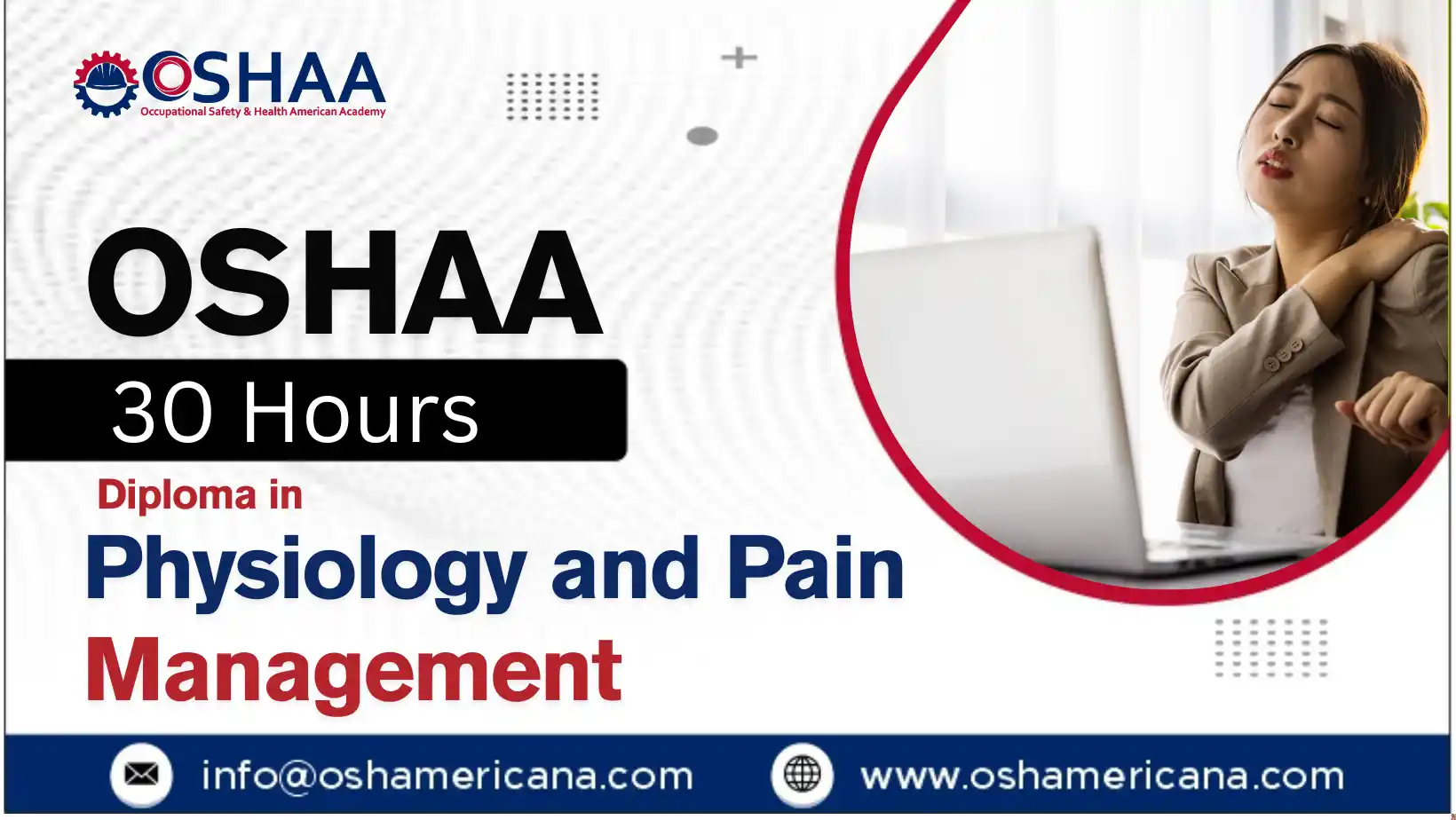The OSHA 30-Hours Diploma in Physiology and Pain Management is a specialised course designed to provide participants with a thorough understanding of the human body’s physiological processes and effective pain management techniques. This diploma offers a comprehensive foundation for those seeking to enhance their knowledge and skills in managing pain through both scientific understanding and practical application.
Pain management is a critical component of healthcare, impacting quality of life and recovery outcomes across a wide range of conditions. Participants will explore the physiology of pain, including how pain signals are generated, transmitted, and perceived by the nervous system. The course covers acute and chronic pain mechanisms, helping participants distinguish between different types of pain and their underlying causes.
The curriculum integrates detailed study of the musculoskeletal, nervous, and endocrine systems, emphasising their roles in pain perception and modulation. Additionally, the diploma explores psychological factors that influence pain, such as stress and emotional wellbeing, recognising the importance of a multidisciplinary approach.
Participants will be introduced to practical techniques including physical therapy modalities, relaxation methods, and lifestyle interventions that support pain relief and rehabilitation. The course also highlights ethical considerations and communication skills essential for working with clients or patients experiencing pain.
OSHAA 30-Hours Diploma in Physiology and Pain Management
Study Units
Learning Outcomes
Introduction to Human Physiology and Pain Concepts (3 Hours)
- Understand the basic principles of human physiology relevant to pain
- Define pain and differentiate between types of pain experiences
- Recognise the importance of pain management in healthcare and wellbeing
Anatomy and Physiology of the Nervous System (4 Hours)
- Describe the structure and function of the central and peripheral nervous systems
- Explain how nerve signals are transmitted and processed in relation to pain
- Identify key nervous system components involved in pain perception
Mechanisms of Pain: Acute and Chronic Pain (4 Hours)
- Differentiate between acute and chronic pain mechanisms
- Understand the physiological processes that underlie different pain types
- Recognise factors that contribute to the transition from acute to chronic pain
The Musculoskeletal System and Pain Implications (3 Hours)
- Describe the anatomy of the musculoskeletal system and its role in pain
- Identify common musculoskeletal pain conditions and their causes
- Understand how musculoskeletal pain affects mobility and function
Endocrine and Immune System Roles in Pain Modulation (5 Hours)
- Explain how the endocrine system influences pain responses and inflammation
- Understand the role of the immune system in pain and healing processes
- Recognise the interaction between hormonal changes and pain sensitivity
Psychological Factors Affecting Pain Perception (3 Hours)
- Identify psychological influences such as stress, anxiety, and mood on pain
- Understand the mind-body connection in the experience of pain
- Explore strategies to address psychological components of pain management
Pharmacological Approaches to Pain Management (3 Hours)
- Understand common medications used in pain relief and their mechanisms
- Recognise the benefits and limitations of pharmacological treatments
- Learn about potential side effects and safe administration practices
Non-Pharmacological Pain Relief Techniques (5 Hours)
- Explore alternative and complementary pain management methods
- Develop practical skills in techniques such as physical therapy, relaxation, and mindfulness
- Understand how to integrate non-pharmacological approaches into personalised pain management plans
Course Benefits: OSHA 30-Hours Diploma in Physiology and Pain Management
- Provides a comprehensive understanding of the physiological basis of pain
- Equips participants with practical knowledge of both pharmacological and non-pharmacological pain management techniques
- Enhances ability to assess and differentiate types of pain for effective intervention
- Improves skills in patient communication and ethical considerations in pain management
- Supports participants in developing personalised and holistic pain relief strategies
- Increases confidence to work effectively in healthcare, therapy, and wellness settings
- Promotes awareness of psychological and systemic factors influencing pain
- Offers up-to-date knowledge aligned with current healthcare standards
- Prepares participants for roles requiring specialised understanding of pain and its management
- Contributes to improved patient outcomes and quality of life through informed care approaches
The OSHA 30-Hours Diploma in Physiology and Pain Management is ideal for participants who wish to deepen their understanding of pain and its management from a scientific and practical perspective. This course is suitable for:
- Healthcare professionals seeking specialised knowledge in pain physiology and treatment
- Therapists and rehabilitation practitioners involved in pain relief and recovery
- Caregivers and support workers assisting individuals with chronic or acute pain
- Wellness practitioners looking to expand their skill set with pain management techniques
- Individuals pursuing a career in healthcare, therapy, or complementary medicine
- Anyone interested in gaining evidence-based knowledge to better manage pain in personal or professional settings
This diploma offers a valuable foundation for participants aiming to enhance their competency and confidence in addressing pain effectively across diverse healthcare environments.







